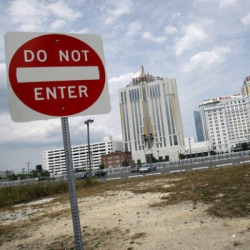The recent spate of casino closures in Atlantic City are raided as a credit negative for the city, a according to Moody’s Investors Service. That could mean the city’s credit rating might be downgraded for the second time this year.
Moody’s cited the dwindling tax base from business taxes, due to 5 projected casino failures by the end of the year. That puts far too much of the tax burden on residents, who do not have the resources and prospects to carry such a burden. Under such circumstances, Atlantic City’s credit could take a hit.
Analysts Lower Tax Rating
A pair of Moody’s analysts, Josellyn Yousef and David Strungis, released a report on November 24 which painted a bleak picture. Yousef and Strungis wrote, “Although the city raised its property tax rate nearly 29% in fiscal 2014, that only increased by 1.4% the amount of money budgeted to be collected in property taxes. This is because the continued loss of casinos has constricted the taxable business base and has shifted the city’s tax burden to its residents, whose ability to pay is hampered by a very high 25% poverty rate and a median family income that is just 42% of the state’s median.”
So the city’s leaders had to raise taxes on its citizens at the very time they could least afford such a hike. Despite the raising of taxes, the treasury grew only by a marginal amount. Even worse, if Atlantic City is to maintain its current budget, it will need to raise taxes on residents again next year, because the tax base on businesses is worse than it was a year ago.
Casino Property Taxes
In 2013, property taxes on Atlantic City’s casinos comprised roughly 70% of the city’s tax base. Currently, the casinos make up about 80% of the city’s current budget. At the end of 2013, the city had 12 casinos in operation. By the end of 2014, it appears the city will only have 7 casinos left.
Four casinos already have closed this year. The Trump Taj Mahal has filed paperwork to close its operations in December 2014. A closing would mean a 5th casino would close this year, significantly affecting the city’s tax base.
50% in Lost Assessed Values in Only 3 Years
According to a Moody’s projection, the assessed values in the city will amount to about $9 billion by the fiscal year ending on December 31, 2015. That would be a 50% decline in assessed value in only three years, since the assessed values amounted to $18 billion on December 31, 2012. That is a stark decline found only in failing cities.
Two recent events play a key fole in the findings of the Moody’s analysts. The first is the imminent closure of Trump Taj Mahal, which should happen by mid-December. That will put 3,000 workers out of a job just a week or two before Christmas. Worse, there’s no sign such jobs would be coming back soon.
Revel Casino Loses a Buyer
Revel Casino was supposed to have a buyer in place after Brookfield Partners LP won a bankruptcy auction in October. Brookfield Partners LP was going to pay $110 million to buy the property, then reopen a casino on the site of the Revel. But it’s negotiations to lower energy costs from its current $3 million a month fell through, so Brookfield pulled out of the deal. Now, Revel Casino’s owners are back at square one.
Moody’s says the two casinos accounted for roughly 15% of the city’s tax base in 2013. Revel Casino and Trump Taj Mahal accounted for 16% of Atlantic City’s hotel fee revenues, 14% of the city’s luxury tax revenue, and 14.5% of all gaming revenues collected. In such circumstances, the tax base is going to have to assume a heavy new burden.

